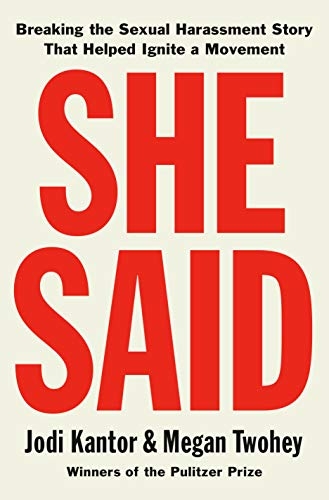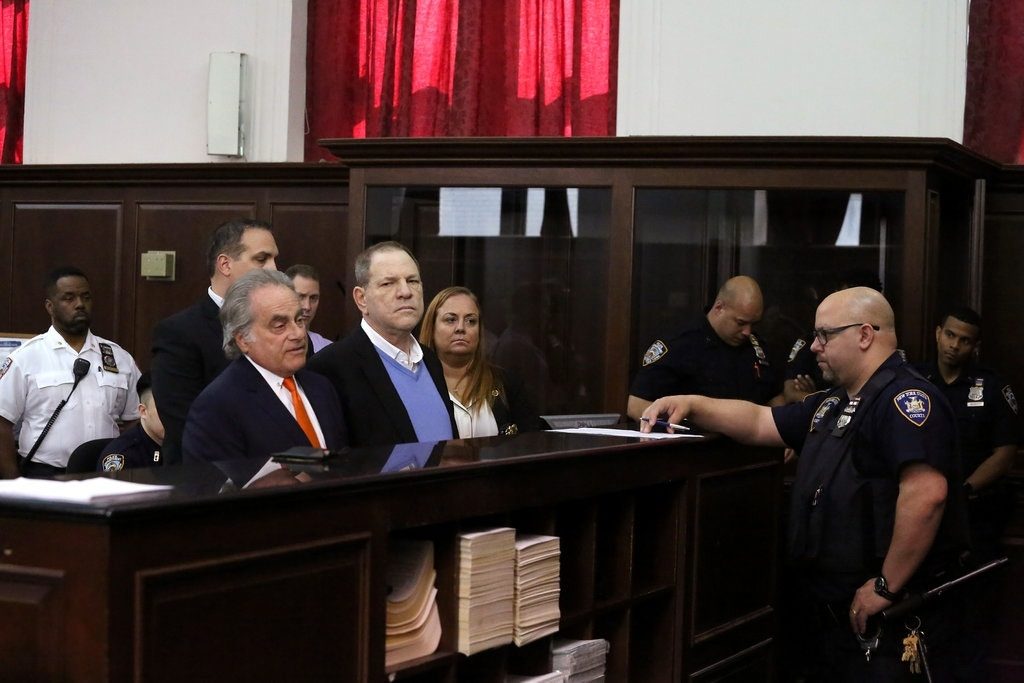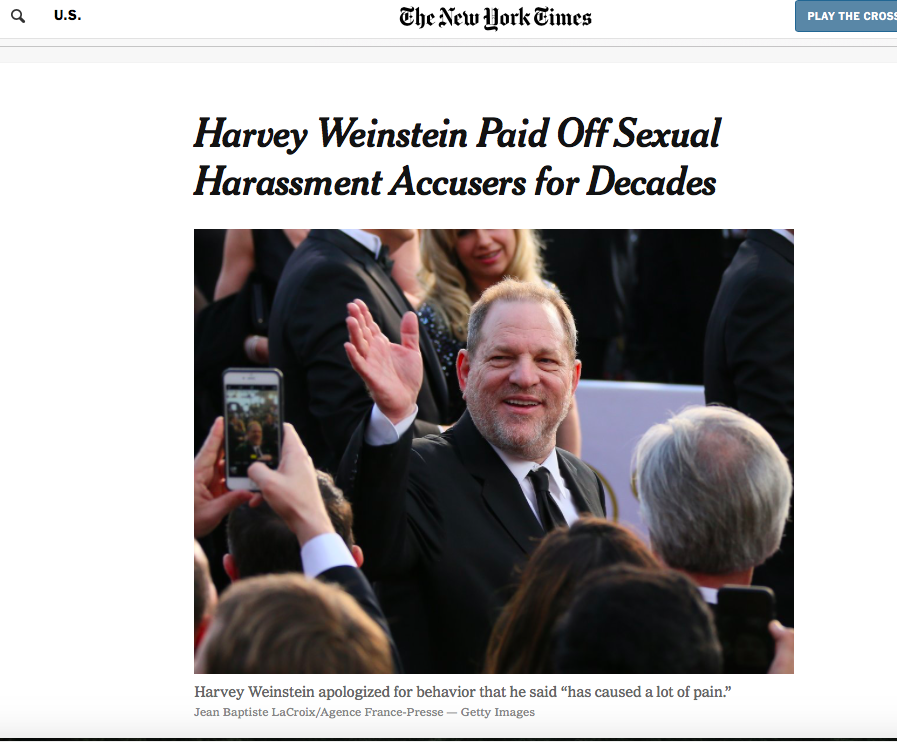 If you’re a journalist or reporter — or even if you used to be — it won’t have escaped your notice that you were the subject of another foot-stamping tantrum by the current occupant of the White House. This time he did it in front of all the countries of the world as he addressed the United Nations General Assembly in New York
If you’re a journalist or reporter — or even if you used to be — it won’t have escaped your notice that you were the subject of another foot-stamping tantrum by the current occupant of the White House. This time he did it in front of all the countries of the world as he addressed the United Nations General Assembly in New York
Yes. Trump told the world this week : “These animals in the press. They’re animals actually. Some of the worst human beings you’ll ever meet […] “They’re scum. Many of them are scum.”
So, it’s a shame that he has the attention span of a gnat because he’ll never get to read She Said, an eye-opening account by two New York Times Pulitzer Prize-winning investigative reporters of how they broke the story which brought the most powerful producer in Hollywood to his (metaphorical) knees.
Story Behind The Story
It’s a real shame because for one, Trump would see how hard journalists really work to establish facts and get access to sources in order to produce a publishable story. Second, it’s a shame because he’ll miss the cautionary tale of how powerful men who are sexual predators eventually get their comeuppance.
She Said is the story behind the story that journalists Jodi Kantor and Megan Twohey broke in October 2017 about Oscar-winning, Hollywood producer, Harvey Weinstein, and his alleged sexual harassment of dozens of actresses and employees in his own company. The expose ignited the #MeToo movement worldwide. Meanwhile, Weinstein lost his job, his position and eventually appeared in court on criminal charges of rape and sexual assault. Charges are still pending against him as he awaits a trial date.

Fascinating Grunt Work
As a former investigative journalist (who helped nail down the story that Amazon Prime recently showed in A Very English Scandal) I know the elation that comes from bringing a powerful man who abuses his power to justice after months and months of grunt work.
She Said is a revelatory, fascinating step-by-step account of precisely that kind of grunt work. Kantor and Twohey spent countless hours on the phone and on social media tracking down actresses and Weinstein company employees who had allegedly been violated by the obese producer. They checked public records for possible complaints filed with federal and state agencies. They criss-crossed the country traveling from New York to Los Angeles to London to win the trust of the victims.
Most of the women were young and had entered the business with dreams and ambitions of making it in the movie industry, either on screen or as producers. The actresses who included Rose McGowan, Ashley Judd and Gwyneth Paltrow refused to speak on the record.
No-one wanted to be first, but it turned out they all had similar stories. A pattern was emerging. Weinstein’s M.O. was to invite eager, young hopefuls to his hotel suite where he greeted them in a bathrobe and asked either for massages or for them to watch, or join him in the shower as he masturbated.
Gruelling Stories

The book documents the back stories of Weinstein’s victims in a way that the 3,300-word NYT article could not. One such victim from Weinstein’s London office was a talented, aspiring producer who as president of the Oxford University Drama Society had produced the play, Euripides in the original Greek.
At the 1998 Venice Film Festival, as a Miramax employee she found herself in Weinstein’s hotel suite where, she said, Weinstein pinned her down on the bed and reassured her saying, “with one single thrust, it will all be over.”
Another employee was promised a job in the company’s London office after helping out as an extra on the location of a Weinstein movie near her home in Ireland. After being dispatched to Weinstein’s hotel room, she was forced to undress for him and shower with him.
“All the optimism I felt for my future was robbed by him,” she told the NYT. “Any hope that I had been offered a job through my own merit was gone.”
Settlements Muzzled Victims
While many of the victimized employees and actresses eventually spoke to Kantor and Twohey at length, they mostly insisted on speaking off-the-record. In some cases, their fear arose out of the fact that they had been persuaded to negotiate financial settlements with the producer — and those settlements included restrictive confidentiality clauses.
It meant that if they talked about their experiences, Weinstein could sue them for breaching the confidential agreements. It also meant they couldn’t explain to future employers why they “had left a top company so abruptly.”
Everyone’s Complicit
At this point, Kantor and Twohey, and their editor Rebecca Corbett realized they needed to get their hands on “written, legal and financial proof.” It was a daunting task given the shroud of secrecy thrown over Weinstein’s misdeeds by corporate officers and company executives who were complicit in keeping quiet about the producer’s wrongdoings.
On top of that, Kantor and Twohey came up against lawyers who presented themselves as protectors of marginalized women, but who in persuading those women to sign financial settlements were also virtually complicit in perpetuating and enabling monsters like Weinstein.
“The settlements had swelled into a cottage industry,” write the authors in the book. “Jodi cut to the point: The United States had a system for muting sexual harassment claims which often enabled harassers instead of stopping them.”
Getting The Goods

Gradually, however, as the book documents in satisfying detail, the persistence of the two journalists started breaking down barriers. At a meeting between Twohey and one of Weinstein’s British victims, the young woman reached into her purse and brought out “a couple of battered pages with the Miramax logo on top”. They were pages from her settlement, but she didn’t have the complete document because it was so restrictive her lawyers would only allow her to read it in their offices.
Subsequently, several former and current company executives came forward because they “hated” Weinsten. Not because of how he had mistreated women, but because he had exposed the company to liability and to scandal.
In one meeting, in Tribeca, an executive passed on a memo written and circulated by a female junior executive who spoke about Weinstein’s mistreatment of women in the company. Useable material was beginning to trickle in.
Nail-Biting Details
Meanwhile, Weinstein hired top lawyers and a security firm to shield him. It appeared that Weinstein and/or people working for him were following Kantor and Twohey on social media watching their clicks on Twitter to see who they were talking to as possible sources.
The book details the process of getting the story onto the front page down to its last, nail-biting details. Standard journalistic practice required the New York Times to present their findings to Weinstein and allow him the opportunity to address or refute the allegations.
The event makes for some humorous reading as Weinstein blusters and threatens and pleads, and begs to be told what Gwyneth Paltrow said on the record about him. Then, in a surprise move, he arrives at the NYT offices with his coterie of lawyers and advisers. One of the lawyers brings photos of Weinstein with some of his accusers “as if polite red-carpet photos were proof that nothing untoward had happened.”
In a final twist worthy of a novel, as the New York Times prepared to publish, actress Ashley Judd called and told Kantor she was prepared to be a named source. “Jodi lost it,” the book observes. “Like a marathoner collapsing at the finish line. Weeping, she searched for something to say to Judd that was equal to the moment, but still professional. The best she could muster was: “This means the world to me as a journalist.”
I understand exactly how she felt.